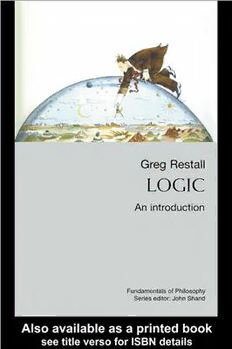Table Of ContentLogic
Logic is a comprehensive introduction to the major concepts and techniques involved in
the study of logic. It explores both formal and philosophical logic and examines the ways
in which we can achieve good reasoning. The methods of logic are essential to an
understanding of philosophy and are also crucial in the study of mathematics, computing,
linguistics and in many other domains.
Individual chapters include:
• Propositions and arguments
• Truth tables
• Trees
• Conditionality
• Natural deduction
• Predicate, names and quantifiers
• Definite descriptions
Logic is an exceptionally clear introduction to the subject and is ideally suited to students
taking an introductory course in logic.
Greg Restall is Associate Professor in Philosophy at Melbourne University, Australia.
Fundamentals of Philosophy
Series editor: John Shand
This series presents an up-to-date set of engrossing, accurate and lively introductions to
all the core areas of philosophy. Each volume is written by an enthusiastic and
knowledgeable teacher of the area in question. Care has been taken to produce works that
while even-handed are not mere bland expositions, and as such are original pieces of
philosophy in their own right. The reader should not only be well informed by the series,
but also experience the intellectual excitement of being engaged in philosophical debate
itself. The volumes serve as an essential basis for the under-graduate courses to which
they relate, as well as being accessible and absorbing for the general reader. Together
they comprise an indispensable library of living philosophy.
Published:
Greg Restall
Logic
Richard Francks
Modern Philosophy
Dudley Knowles
Political Philosophy
Piers Benn
Ethics
Alexander Bird
Philosophy of Science
Stephen Burwood, Paul Gilbert and Kathleen Lennon
Philosophy of Mind
Colin Lyas
Aesthetics
Alexander Miller
Philosophy of Language
Forthcoming:
Suzanne Stern-Gillet
Ancient Philosophy
Logic
An introduction
Greg Restall
LONDON AND NEW YORK
First published 2006 by Routledge 2 Park Square, Milton Park, Abingdon, Oxon OX14 4RN 270
Madison Ave, New York, NY 10016
Routledge is an imprint of the Taylor & Francis Group
This edition published in the Taylor & Francis e-Library, 2006.
“To purchase your own copy of this or any of Taylor & Francis or Routledge's collection of
thousands of eBooks please go to www.eBookstore.tandf.co.uk.”
© 2006 Greg Restall
All rights reserved. No part of this book may be reprinted or reproduced or utilised in any form or
by any electronic, mechanical, or other means, now known or hereafter invented, including
photocopying and recording, or in any information storage or retrieval system, without permission
in writing from the publishers.
British Library Cataloguing in Publication Data A catalogue record for this book is available from
the British Library
Library of Congress Cataloging in Publication Data Restall, Greg, 1969– Logic: an
introduction/Greg Restall. p. cm.—(Fundamentals of philosophy) Includes bibliographical
references and index. 1. Logic. I. Title. II. Series. BC108.R47 2005 160–dc22 2005015389
ISBN 0-203-64537-5 Master e-book ISBN
ISBN 0-203-69367-1 (Adobe e-Reader Format)
ISBN 10:0-415-40067-8 (hbk)
ISBN 10:0-415-40068-6 (pbk)
ISBN 13:9-78-0-415-40067-1 (hbk)
ISBN 13:9-78-0-415-40068-8 (pbk)
ISBN 0-203-64537-5 Master e-book ISBN
ISBN 0-203-69367-1 (Adobe e–Reader Format)
ISBN 0-415-40067-8 (Print Edition)
To my teachers, and to my students.
Contents
Acknowledgements ix
Introduction 1
5
PART 1 Propositional logic
1 Propositions and arguments 6
2 Connectives and argument forms 14
3 Truth tables 26
4 Trees 40
5 Vagueness and bivalence 57
6 Conditionality 65
7 Natural deduction 75
82
PART 2 Predicate logic
8 Predicates, names and quantifiers 83
9 Models for predicate logic 94
10 Trees for predicate logic 110
11 Identity and functions 125
12 Definite descriptions 137
13 Some things do not exist 144
14 What is a predicate? 155
15 What is logic? 160
Bibliography 164
Index 167
Acknowledgements
Many people have contributed to this book. I thank my students, who never fail to come
up with new insights each time I teach this material. Two students from my 1998 class,
Alicia Moss and David Wilson, went above and beyond the call of duty in collating
embarrassingly long lists of errors in the early drafts of this manuscript. I owe special
thanks to James Chase, who used a draft of this text in an introductory logic course and
who provided many of the exercises and examples. My research assistant Robert
Anderson helped find some errors and infelicities of expression in the final draft.
I thank my own teachers, especially Rod Girle, Graham Priest and John Slaney. They
will each find some of their ideas and attitudes reflected in this text. I will be pleased if I
am as able to inspire and enthuse others as my teachers have been able to inspire and
enthuse me. Finally, thanks to my family: First, to Christine Parker, whose love and
companionship has taught me more than I can express in words. Second, to Zachary Luke
Parker Restall, who has been learning to reason just as I have been finishing writing this
book.
Greg Restall
The University of Melbourne
[email protected]
March 2003

